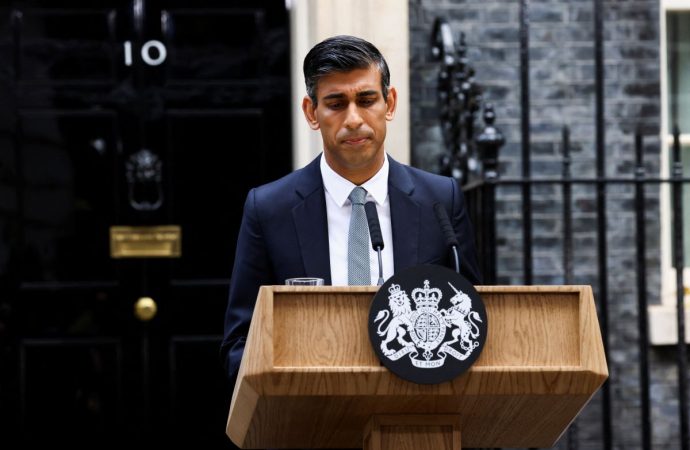Introduction The political landscape in the United Kingdom is witnessing a significant shift as voter support for Reform UK grows, posing a potential threat to Chancellor Rishi Sunak’s position on the right flank. Political analyst Dr. Andrew Thompson explores the factors behind Reform UK’s surge and the challenges it presents for Sunak’s political standing. Reform
Introduction
The political landscape in the United Kingdom is witnessing a significant shift as voter support for Reform UK grows, posing a potential threat to Chancellor Rishi Sunak’s position on the right flank. Political analyst Dr. Andrew Thompson explores the factors behind Reform UK’s surge and the challenges it presents for Sunak’s political standing.
Reform UK’s Rising Popularity
Reform UK, the political party founded by Nigel Farage, is gaining traction among voters, signaling a shift in the right-wing political landscape. Dr. Thompson dissects the key elements contributing to Reform UK’s rise and its potential impact on Sunak’s position.
Factors Driving Reform UK’s Popularity

This image is taken from google.com
- Anti-Establishment Sentiment: Reform UK taps into anti-establishment sentiments, offering an alternative for voters disenchanted with mainstream politics, a sentiment that resonates on the right flank.
- Focus on Economic Policies: The party’s emphasis on specific economic policies, deregulation, and free-market principles attracts voters who seek a more conservative approach to economic governance.
- Leadership Appeal: Nigel Farage’s leadership and ability to connect with a broad base of voters provide Reform UK with a charismatic figurehead, drawing support from those seeking a distinctive voice on the right.
Threat to Sunak’s Right Flank

This image is taken from google.com
Dr. Thompson analyzes the potential threat Reform UK poses to Chancellor Rishi Sunak’s position on the right flank of British politics, considering the challenges it introduces for Sunak’s political trajectory.
Challenges for Sunak

This image is taken from google.com
- Policy Differentiation: Reform UK’s focus on specific economic policies may lead to challenges for Sunak in differentiating his economic approach, potentially eroding support from voters seeking a more conservative agenda.
- Leadership Competition: The charismatic leadership of Nigel Farage may divert attention and support from Sunak, as voters drawn to right-wing ideologies may find Reform UK’s leadership more aligned with their preferences.
- Shift in Voter Base: The rise of Reform UK could result in a shift in the traditional voter base on the right, impacting Sunak’s ability to secure broad support within his own political spectrum.
Sunak’s Response Strategy

This image is taken from google.com
As Reform UK gains momentum, Dr. Thompson explores potential strategies for Chancellor Rishi Sunak to navigate this evolving political landscape and maintain his position on the right flank.
Possible Response Strategies
- Policy Clarity: Sunak may emphasize policy clarity and articulate a distinct economic vision to differentiate himself from Reform UK and address the concerns of right-wing voters.
- Engagement with Base: Proactive engagement with the traditional right-wing base through town halls, public forums, and outreach campaigns can help Sunak solidify his support within the constituency.
- Coalition Building: Sunak may explore opportunities for coalition building within the right-wing spectrum, aiming to create alliances that strengthen his position against potential competitors.
Conclusion
As Reform UK garners increasing support, Chancellor Rishi Sunak faces a formidable challenge in maintaining his standing on the right flank of British politics. Dr. Andrew Thompson’s analysis provides valuable insights into the factors driving Reform UK’s surge and the potential implications for Sunak’s political trajectory. The coming months will be crucial in determining how Sunak adapts to this changing landscape and whether he can effectively address the challenges posed by the rising popularity of Reform UK.
















